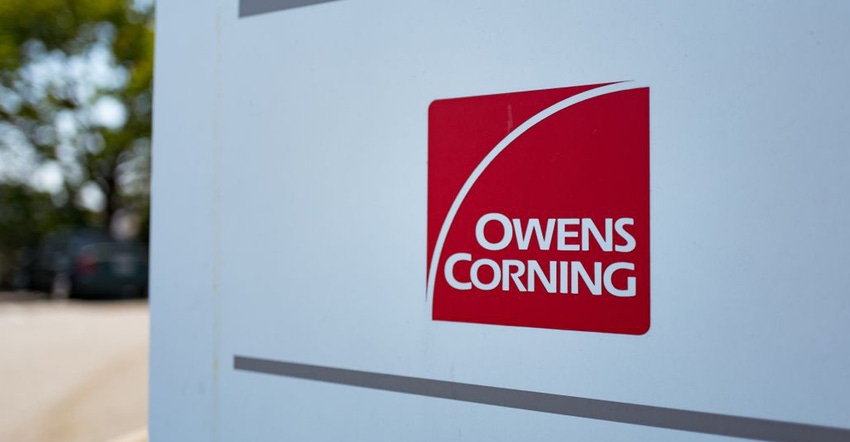Owens Corning Notes 2021 Progress Toward 2030 Sustainability Goals
Insulation, roofing and fiberglass composite manufacturer Owens Corning has released its 16th sustainability report, highlighting the company's ambitions to "build a sustainable future through material innovation." The Toledo-based company provided details on its progress toward its 2030 goals, citing 16 topics shareholders have indicated are indicative to reducing Owen Corning's environmental footprint.

Insulation, roofing and fiberglass composite manufacturer Owens Corning has released its 16th sustainability report, highlighting the company's ambitions to "build a sustainable future through material innovation."
The Toledo-based company provided details on its progress toward its 2030 goals, citing 16 topics shareholders indicated are indicative to reducing Owen Corning's environmental footprint.
Both CEO Brian Chambers and Frank O'Brien-Bernini, senior vice president and chief sustainability officer, detailed the manufacturer's commitment to "lower greenhouse gas emissions; increased recycled content/circularity; energy and process efficiency improvements; more renewable energy use; and fuel switching from on-site fossil fuel use to low- or no-carbon solutions."
"In 2021, as in any business environment, our 2030 sustainability goals helped us stay focused on the future while we navigated the present," they stated in the document. "We have established roadmaps to help our teams understand what’s needed to meet our environmental footprint reduction goals. These roadmaps guide our short-, mid-, and long-term strategies, and help ensure that sustainability remains our priority as we innovate to serve our customers while addressing both the challenges and the opportunities within the relevant secular trends."
Owens Corning is the largest producer of fiberglass insulation, with 2021 sales totaling $8.5 billion. The company, which was founded in 1938, employs more than 20,000 workers in 33 diffecrent countries and has ranked in the Fortune 500 for the last 66 years.
The manufacturer finalized two acquisitions in 2021 in line with its renewable energy commitments, in line with its 2030 goal to source 100 percent renewable electricity. Renewable sources such as wind, hydro, solar and geothermal power comprise about 51 percent of Owen Corning's energy holdings to date.
The report highlights improvements in operational efficiency to lower greenhouse gas (GHG) emissions throughout its value chain. Owens Corning has reduced its emissions 60 percent since 2007.
Referencing the full value chain which includes a robust amount of recycled glass for its product, Owens Corning stated that it consumed more than 1.4 billion pounds of recycled glass in 2021. The company noted that using recycled materials is a significant contributor to lowering its scope 1, 2 and 3 GHG emissions.
"Beyond environmental footprint reduction 'within' our plants, we are working to refine our understanding and set measurable goals for our impact on biodiversity and the circular economy, as well as continually seeking better ways to measure our progress on social impact priorities like inclusion and diversity," added Chambers and O'Brien-Berini.
Workplace initiatives drove diversity, equity and inclusion (DEI) at the company. Nearly 51 percent of its hires in the United State in 2021 identified as coming from an underrepresented group, a rise of 40 percent from 2018.
The 2021 Sustainability Report also highlighted its occupational safety efforts, with Owens Corning boasting a recordable incident rate in 2021 that was 81 percent below industry average.
Owens Corning stated that opportunities are abound because of current trends in housing prices; evolving construction practices with continuing labor shortages; "demand for sustainable solutions for decarbonization and circularity;" and "durable" infrastructure investments.
Nearly 60 percent of the company's revenue is derived from its portfolio of products aimed at saving energy or reducing emission, mirroring market demand.
"These products have a role in energy efficiency improvements, housing renovation and construction, and increased renewable energy penetration — so the more we reduce our environmental footprint, the faster we achieve our net-positive aspiration," said Chambers and O'Brien-Berini.
About the Author(s)
You May Also Like




